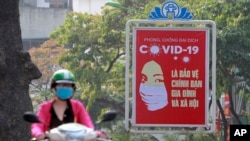Vietnam has received favorable recognition worldwide for containing the spread of the novel coronavirus and reopening the nation’s economy, but that good news is small comfort for Tran Thi Hien, who collects scrap metal she can resell for cash.
After the government announced a pandemic relief fund, she applied two times but says she has yet to hear back. Some suggested the reason for the delay is because she had to apply in her hometown. Others surmise that she was not in the eligible age range.
Hien, 43, said the process was “too complicated” but held out hope.
“The government's support package is really a savior for independent workers like me,” she said.
Even for a place like Vietnam, which reported zero coronavirus deaths and 349 cases, the pandemic hit the economy hard, with the impact falling hardest on laborers who live on meager subsistence wages. While white-collar employees could work at home or take paid days off in lockdown, those in the informal sector, such as Hien, must show up and do physical work if they’re going to afford food and housing.
Supporters of the pandemic relief fund want to prevent a disconnect between the lofty goals of the aid package and the impact on citizens, particularly those in most need. Organizations, from Oxfam in Vietnam to the Pioneer Network for Ethnic Minority Voices, have stepped up with what they call “hotlines.” They compile feedback from people such as Hien and send it to labor and provincial agencies distributing the aid, as authorized in the state regulation, Decision 15/2020-TTg.
Nguyen Thu Giang, executive director of Migrant Labor Action Network, or M.net, said she wants to help government agencies so they “can promptly compare, check and respond to people's opinions, and at the same time make adjustments to policies or implementation methods, ensuring that Decision 15/2020-TTg is implemented, in a transparent and effective way.”
The relief fund is worth close to $2.7 billion, though the ruling Communist Party has also tapped sister organizations to mobilize donations and volunteers, from the Youth Union to the Vietnamese Fatherland Front. Authors of a study of Vietnam’s COVID-19 response in Sustainability, a science journal, noted that the prime minister called on citizens to help “combat” the disease.
“Responding to this call, one can easily see many images of bank transfer to the Vietnamese Fatherland Front on social media of Vietnamese people to support the government in the combat,” the study said. “On a larger scale, many enterprises, regardless of their size, also contributed to the national combat by donating their products such as masks, rice or milk, by donating their hotels for isolation wards—or most popularly—by donating cash.”
Anti-poverty advocates are working to get as much of the aid money as possible to the most vulnerable in society. Oxfam in Vietnam said it is focused on the unemployed and the working poor, such as those who worked without contracts or were put on leave without pay during the pandemic. It also targets migrant workers such as Hien, who moved to the capital, Hanoi, from the nearby province of Nam Dinh. Many rural dwellers relocate to cities for better work opportunities but can’t access social services because they are not registered with local authorities.
Oxfam in Vietnam said it set up a hotline for the relief fund so that "no one is left behind.”
“This initiative will create more opportunities for people to conveniently and confidently send feedback, from which the local government will have accurate, timely and quality information to provide better services,” Babeth Ngoc Han Lefur, Oxfam in Vietnam director, said.





